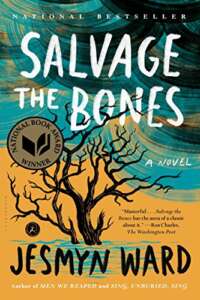 Discussion questions for Salvage the Bones by Jessmyn Ward
Discussion questions for Salvage the Bones by Jessmyn Ward
- Were you struck by the amount of blood featured in this book? Why do you think Ward chose such an evocative image to use so often?
- Compare Esch and China. Can they be mothers and fighters at the same time?
- Ward describes her language as hypnotic. Agree?
- “I realized that if I was going to assume the responsibility of writing about my home, I needed narrative ruthlessness. I couldn’t dull the edges and fall in love with my characters and spare them. Life does not spare us.”
- We finally find out Junior, Skeetah, and Mama’s real names, but not how Steekah got his nickname. Why do you think Ward chose not to reveal this? What about Esch’s name? Is that her real name, or a nickname?
- The New York Times‘s reviewer says: “Jesmyn Ward … plays deftly with her reader’s expectations: where we expect violence, she gives us sweetness. When we brace for beauty, she gives us blood.” Did you find yourself surprised by the novel?
- The New York Times‘s reviewer also says that Esch is “a singular heroine who breaks the mold of the typical teenage female protagonist. [She] isn’t plucky or tomboyish. She’s squat, sulky and sexual.” What did you think of Esch as a character? Were you able to reconcile her character with your expectations?
- The Guardian‘s reviewer says of Esch: “She’s so tough, in fact, that it takes a while to realise how deprived these motherless children are. Details seep out like involuntary revelations.” Did you make assumptions about the characters that turned out not to be accurate?
- In an interview with NPR, Ward was asked about how she responds to people who say her book is “poverty porn”. “You know, it’s like you’re exposing people’s lives in a way that perpetuates the stereotypes that people are just ignorant, passive observers in their own lives, you know, just living, really, in just a litany of sorrows.” WARD: “I get angry, because this is the truth. You know, like this is the reality for so many people where I come from and it was the reality for me for a portion of my life… I think, when I write, one of the things that I’m really attempting to do is I’m attempting to humanize my characters. I feel a lot of pressure when I’m writing because I know, you know, if they looked at a synopsis of the book, what they read could only confirm all the stereotypes that they have about us and about people like us.” What do you think?
- The Los Angeles Times‘s reviewer thinks that “[t]his would probably be the right place to mention that if you have a problem with dogfights, this might not be the book for you. Or girls having casual sex with their older brothers’ friends at age 12, for that matter. Yet the story is told with such immediacy and openness that it may keep judgments at bay.” Were you offended by anything in the book? Did the writing or story itself compel you to keep reading?
- Many readers identify Esch as the main character, but the Washington Independent Review of Books‘s reviewer argues that “Esch as a character moves the reader to sympathy, but it is Skeetah who drives the story.” What did you think about Skeetah as a character? Who do you think is, or should be, the focus of the story?
For more questions, check out the resources at Reading Group’s Guides.

